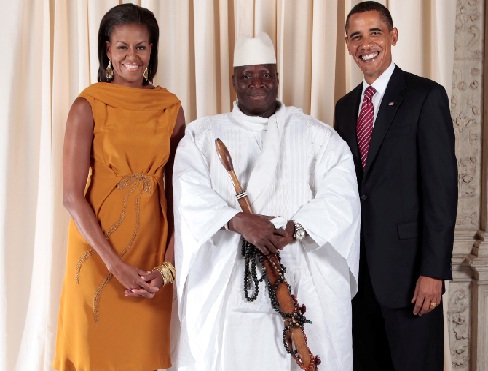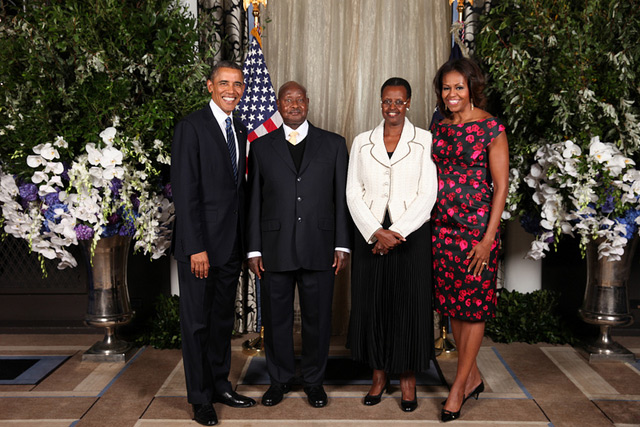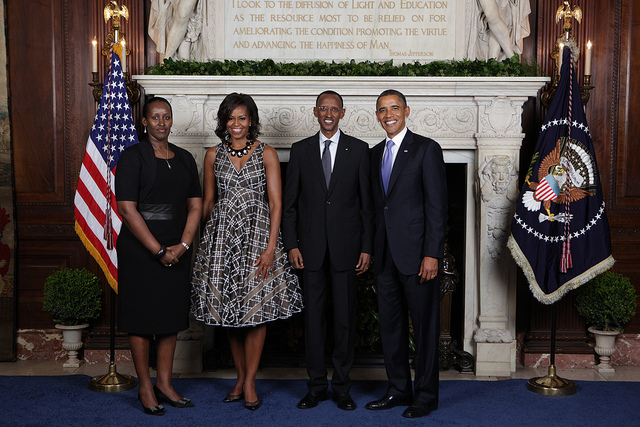You have to sympathise with modern dictators, there’s so much more work to do than the good old days and as we all know keeping up to date with your social media accounts is a time-consuming business. Admittedly it does seem to defeat the point of being a dictator by having to worry about your public image but such are the social pressures in the 21st century, it was so much more simple when you just had to say, “agree with me or I will kill you, along with your entire family for good measure and maybe a few innocent bystanders just to make the point”. Virtually all the world’s despots feel the need to “connect with the people” via a Facebook page, though for some you have to wonder why they bother.
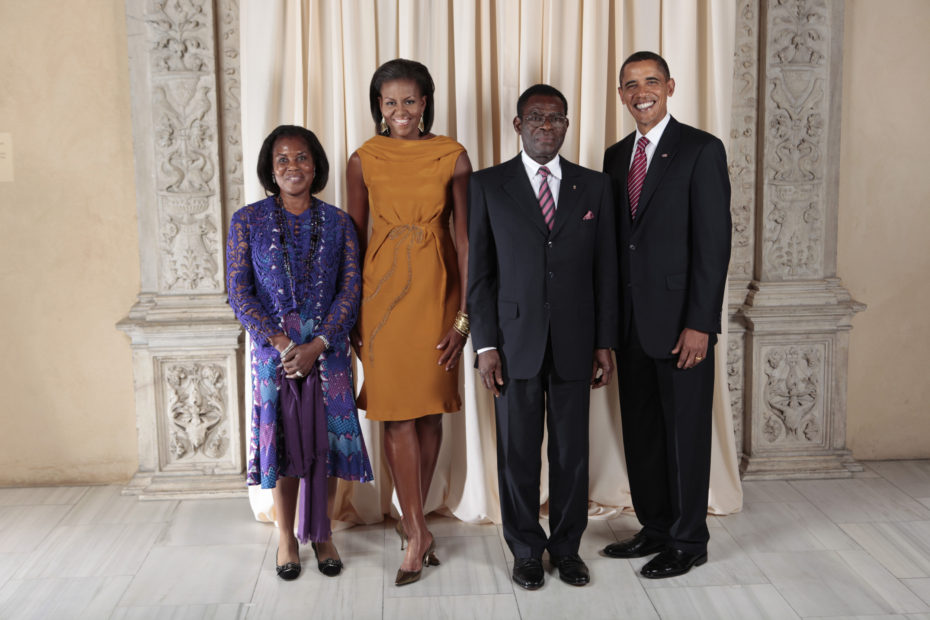
Teodoro Obiang’s reputation for being Africa’s worst dictator means there is a steady queue of world leaders at his door looking for photo ops
Take poor old President Obiang of Equatorial Guinea (Africa’s longest-serving leader), he must be crying into his Swiss bank account at only having 64 followers – the humiliation only mildly softened by the billions of dollars he has siphoned off the oil industry while half the country scrapes by on a dollar a day or less. You have to admire his sense of humour however, commenting on the latest oil wealth corruption scandal in Nigeria, he writes on his FB page, “Nigeria is strange. The government “misplaces” a few billion and the whole country gets upset. I could NEVER rule a place like that”. Both President dos Santos of Angola and the delightfully named Ali Bongo of Gabon are in a similar position, with Ali languishing at the bottom of the FB dictator charts with only 21 followers, though neither are short of a few quid thanks to oil. If they updated their pages a bit more often they could rescue their lamentable positions but are probably too busy spending their ill-gotten gains.
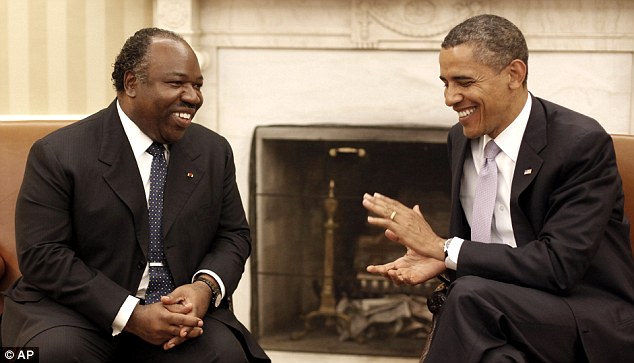
“So President Bongo I hear you only have 21 Facebook likes”, “Yes but I have got several billion dollars my dad helped me screw out of the oil industry, would you like to buy any while you are here”?
The ever popular Robert Mugabe cannot be accused of neglecting his FB page as he regularly posts his words of wisdom, usually concerning the rights of Africans over the dreaded whites, whilst neglecting to mention the rights of all those black opponents of his who were denied even the right to live, such as the 20,000 or so in Matabeleland whose bones can be found crumbling in long forgotten mine-shafts. His page is also a lively opportunity to discredit the reports from British media which question his practices, although conveniently forgetting to furnish any evidence for this. All his posts are laden with comments from his adoring fans, even those in other African countries wishing they had a president like him. The prize for the most fawning, sycophantic comments must go to the followers of Gambia’s president Yahya Jammeh, a good example being for his birthday: “you deserve more than birthday wishes you are a man of qualities, if I could bring down the sky on your feets and the moon and place it In your hand, believe mr. President I won’t hesitate. I wish u all the best”. Of course in a land where mentioning anything critical of His Excellency is rewarded with an express ticket to the torture chambers, it may be wise to give the impression of sounding appreciative of his noble efforts to run the country, particularly on his birthday.
Jammeh’s description of himself as a “politician fighting corruption, witchcraft & HIV” is an interesting take on reality: corruption obviously doesn’t refer to his own, besides a Freedom House report http://www.freedomhouse.org/report/countries-crossroads/2012/gambia#.UxiaW_l_uSo in 2012 declared that “corruption is more rampant than ever”; accusations of witchcraft are often used in West Africa as an easy way of discrediting people, particularly when you run the country, as it is impossible to disprove; Jammeh claims to have discovered a herbal cure for HIV but for some reason the world’s scientists have not taken him seriously. None of this prevented the Obamas posing for a photo with him, proudly displayed on his home page. Now that Nelson Mandela is gone, Obama is the must have photo-op for any African leader and he seems happy to oblige, with the long-held US (and UK) tradition of propping up brutal, corrupt dictators as long as they are prepared to sell us their oil or kill the right people for us.
Facebook is an ideal format for spouting pearls of wisdom to the masses, as Mugabe has found, though he lacks the more philosophical leanings of Isaias Afewerki of Eritrea. Retaining his unique use of capital letters my two favourites are:-” Portraying Unrealistic Image through Exaggerated Expectations Is Not The Eritrean Governments Political Culture; Even as we are confronted by zig zags, ups and downs & obstacles, our national compass unfailingly points to our steadfast goals”. This can almost certainly be translated as, “you’re fucked no matter what happens”. Some less than charitable person has set up another FB page for him, entitled Isaias Afewerki Dictator, as a means of displaying their Photoshop skills, producing mildly amusing depictions of the president.
And this goes to the heart of the problem with social media for the dictator: it’s just as easy for your enemies to use it against you. The fake page is a common tactic, as president Joseph Kabila of the Democratic Republic of Congo has found, unless he really did want his pornographic prowess displayed to all the world. Also, opposing fan pages can battle it out, the hottest competition being in Swaziland, where We love King Mswati is competing with We hate King Mswati, currently almost neck and neck in the Likes battle. Both sides post on each others pages but the king’s penchant for marrying teenage beauty pageant entrants provides plenty of ammunition, as does his more than lacklustre commitment to human rights. Togo’s Gnassingbe and Burkina Faso’s Blaise Campoare have also both had to battle against enemy pages, but as their regimes have stuck around for decades already the opposition will have to work a bit harder. If Field Marshall Al Sisi is going to make a real go of running for president in Egypt he will need more than the 749 likes on the Sisi for president page, though he is ahead of the 163 likes for the Al Sisi Crimes page, depicting gruesome photos of the victims of his clampdown on the Muslim Brotherhood
Many people may have been dissuaded from posting critical comments on Mugabe’s and Jammeh’s pages, understandably fearing 240v to the testicles but other regimes don’t have such compliant populations. When the president of Chad, Idriss Deby asked for a response from the country’s youth one answered, “we don’t like you because there is no electricity, justice, equality and peace”. Unsurprisingly Ugandan president Museveni’s site has been flooded with comments criticising his anti-homosexual bill to counteract the bigotry of his followers, whose knowledge of African social history conveniently forgets that it was largely western Christians who introduced the concept of homophobia to Africa.
Many leaders are under the sad delusion that people wish to view an interminable series of photos of their president at meetings with the minister for agricultural affairs or shaking hands with the foreign secretary of some even less important state. If there is one thing dictators never tire of seeing however, is pictures of themselves on their Facebook page, although some do like to add photos of their adoring masses cheering him on at a carefully staged rally.
So, who is the king of the Facebook dictators? I proudly announce that this year’s winner ……..(drum roll please)….with 114,833 likes is……..the president of Rwanda, Paul Kagame. With plans for a high-tech, internet hub nation Kagame has obviously embraced modern technology and wants it to benefit his people, except for those who oppose him, who for some strange reason keep ending up in jail or dead. There are numerous other sites in his name, some more dubious than others but if the HE Kagame Paul page is anything to go by he has a number of buxom lady fans devoted to him, even going as far as doing his dishes for him in a skimpy bikini.
All these authoritarian leaders in search of devotion from the adoring FB masses could well look to the true African Facebook winners: John Mahama of Ghana (344 026 likes) and Joyce Banda of Malawi (537 283 likes) whose democratic credentials far outstrip any of the above. The outright winner by a huge margin with 1 322 290 likes is a rather less clear-cut example: Goodluck Jonathan of Nigeria https://www.facebook.com/jonathangoodluck. This president of a corrupt and dysfunctional state, for all his faults doesn’t really merit the title dictator and in all likelihood his aides just waved huge bundles of cash, courtesy of “misplaced” oil revenues to buy a lot of likes. A look at the comments from Nigerians under his dull official pronouncements give a far better flavour of Africa than any president’s official pages, among the intense debates on numerous topics, enterprising Nigerians have posted: adverts for cars and dating agencies, religious sermons, mobile phone scams, invitations to join the Illuminati and pleas for jobs in government departments. So for their unfailing commitment to the democratic possibilities of social media I award the 2014 African Facebook prize to the people of Nigeria.




